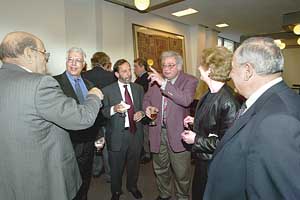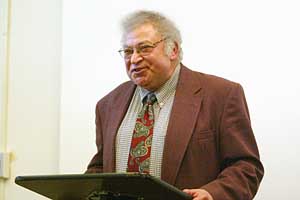Lectureship strengthens commitment to Arabic language
By Seth SandersNews Office
 Donors Albert Joseph and Talat Othman (left to right), Professor Rashid Khalidi, Professorial Lecturer Farouk Mustafa, Dean Janel Mueller and donor Jamal Alwattar gather at a recent celebration in honor of the first Ibn Rushd Lectureship, to which Mustafa has been named. Donor Antoin Rezko, who attended the event, is not pictured. |
Farouk Mustafa recalls with awe the time he ran across William Rainey Harper’s Qur’an. On sale at a Joseph Regenstein Library sell-off of duplicates, the crumbling volume contained detailed marginal notes on the Arabic text by the University’s founding president, an icon of Chicago’s enduring commitment to the study of Near Eastern languages and cultures. Having already stretched the limits of what he could reasonably carry or afford, Mustafa had to let it go.
But now, after years of teaching and scholarship at Chicago, Mustafa, Professorial Lecturer in Near Eastern Languages & Civilizations and the College, again finds himself at the center of the University’s commitment to Arabic.
Last month, he was awarded the first Ibn Rushd Lectureship in Modern Arabic Language. The award will permanently provide for the teaching of first- and second-year classes, keeping pace with rapidly rising interest in Arabic on campus.
At the ceremony, Janel Mueller, Dean of the Humanities Division and the William Rainey Harper Professor in English Language & Literature and the College, spoke about the significance of Arabic literature for the University’s mission. She also discussed how her appreciation of Islamic literature had grown during the recent search for a position in Classical Arabic.
 Farouk Mustafa addresses faculty members and the donors whose gifts provided funding for the first Ibn Rushd Lectureship in Modern Arabic Language, to which Mustafa has been named. |
Rashid Khalidi, Professor in Near Eastern Languages & Civilizations and the College, had flown in from France to attend the ceremony, at which he expressed appreciation for the Arab-American community effort that made the named lectureship possible.
The efforts were, said Khalidi, “particularly fortuitous, because the lectureship was based on a two-for-one matching grant from the Andrew W. Mellon Foundation. If they had not been there, we would have received nothing. As it was, the grant inspired them to contribute substantially.”
Khalidi added that the simple fact of having a University chair with an Arabic name would be important to Arab and Muslim students, symbolizing their contribution to the culture at Chicago.
Talat Othman, one of the chief donors and organizing forces behind the lectureship, spoke of the significance of the award for speakers of Arabic outside academia. With his fellow donors Antoin Rezko, Albert Joseph and Jamal Alwattar listening, Othman explained that the Arab-American community is entering a more settled stage where “they feel comfortable contributing, more than ever, to society. It’s within the culture and the heritage to give, and we hope it will get others involved,” referring to the recent granting of a position in Turkish and the continuing search for one in Persian.
Fred Donner, Chairman of Near Eastern Languages & Civilizations, said, “The lectureship ensures that we will always have a first-rate Arabic lecturer to give students a grounding in the language. You can teach all sorts of interesting things about the Near East, but to really go into depth you have to have the languages. How well could you understand the United States without knowing any English?”
Donner also noted the significance of the name of the lectureship. “The chair has been named after an important philosopher who has great resonance in Arabic cultural terms.”
Othman commented that the donors, who originally suggested the name, thought it would be representative of teaching and learning at Chicago.
Mustafa explained Ibn Rushd’s crucial significance to the Muslim, Christian and Jewish worlds: “Ibn Rushd was a medieval Muslim philosopher known in the West as Averroes. He was a champion of rationalism and very liberal in his thinkingóso liberal, as a matter of fact, that some fundamentalist groups burned his works. His name has been taken up by various organizations to represent this lost paradise in Islamic history where diverse ideas coexisted.
“He lived in Muslim Spain, in the golden age of tolerance among Muslims, Christians and Jews. His teachings, along with a philosophical commentary on Aristotle, were widely circulated and taught in European universities of the time; they helped bring about the Renaissance by giving European scholars what was often their first contact with Greek learning. There are still passages of Aristotle only preserved for us in Ibn Rushd’s quotations, which you’ll see noted if you look in any good edition of Aristotle.
“The church was also slightly upset with him. They accused those who taught him in Christian schools of a new heresyóAverroeism.”
Upon receiving the lectureship, Mustafa had a more personal reaction: “Ibn Rushd is one of my few heroes. He represents all I could hope to do or be.”
Mustafa commented on the increasing demand for knowledge of Arabic at Chicago: “This year we had triple the usual enrollment in Arabic classes. What I like most about teaching it is dispelling the rumor that Arabic is a difficult language. It’s one of the most beautiful and logical languages on earth.”
The new lectureship will strengthen a program started by Harper, himself a major scholar of the Semitic languages. Mueller expressed the University’s gratitude: “There could be no more timely or more welcome news than the completion of this endowment. The distinguished and generous donors have the gratitude of the entire Humanities Division, for assuring vital support for instruction in modern Arabic.”
![[Chronicle]](/images/small-header.gif)